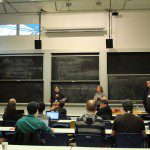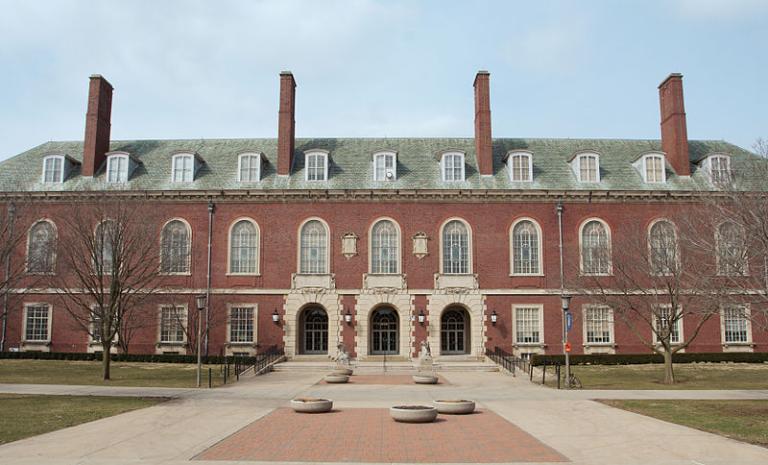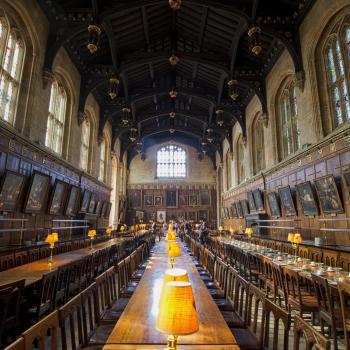Today my son had a soccer game — just the house league, and he’s one of those players who, if the ball comes his way, he’ll kick it, but he’s not out there ahead of the others scoring goals. And the weather was unseasonably cold, though happily the rain slowed and ultimately stopped, though the field was drenched.
Which meant that, having looked at the core-curriculum study last night, I spent the game mentally thinking through the whole question of “what should the core curriculum be?”
Writing
This is the easiest piece: students should have a “college-level” writing ability regardless of whether they major in the liberal arts or the sciences, though students should be able to meet this requirement by taking “freshman comp” or maybe alternately by a combination of a placement test and some other coursework which involves significant amounts of writing.
History
Yes, not surprisingly, I think history should be a significant portion of a core curriculum. The basic requirement should be a core competence in world history, tested via a placement test. Do you know what the Cultural Revolution was? What the key dates and events were in World War II? and so on.
And here’s where I’d bring this requirement into the 21st century. The placement test would consist of sections for different time periods and regions, you’d get credit where you could, and would have to take modules for the remainder, probably with a combination of online and textbook learning rather than in the classroom, and probably at a level of rigor that’s less than what it would be if you had to take a full-year US survey and European survey and “other” survey (and with a reduced level of credit granted). But the point is, you need to understand the basic outlines, and colleges shouldn’t take it for granted that kids get this in high school, in the same way as they don’t take it for granted that kids get the writing skills in high school.
The second part of the requirement would be some kind of a “themes in history” class which would attempt to try to incorporate the two elements of “actions have consequences” and “same . . . but different” from yesterday’s blog post, with a fair amount of choice as to the time period and region selected, so long as the class adheres to certain common guidelines.
Alternatively, this could be two courses — one a traditional history course with a heavy does of Cause and Effect and the other a course about another culture, which can be chosen from history department offerings (e.g., Classical Greece) or another department, such as “Chinese Studies” or the like, with the stipulation that a foreign student, or a student with a significant background in the country can’t choose that region — or a series of two courses could be chosen which incorporate aspects of both.
Math
Placement test, again, or remedial non-credit coursework to demonstrate or attain competence in all the topics of “college-prep high school math” would be the basic prerequisite, but the general-education requirement, for anyone who’s not otherwise taking “real” math, would be a practical one: a course in basic statistics (including data interpretation and hypothesis testing), with some interest theory thrown in.
Science
Science is a bit trickier. The required “science for non-majors” course should decidedly not be a course in environmentalism and sustainability and global warming and so forth. My ideal class would be the result of actual scientists putting their heads together and figuring out what the basic concepts are that educated people need to understand, based on the articles they read, and facebook posts, and the like, that make them want to pound their heads into the wall.
Social Sciences
This is where things get trickier still — because students should understand “civics,” as traditionally understood (though, again, this should be remedial, remedying deficiencies if a student hasn’t learned the material in high school), should have a basic understanding of economics, and should be able to discuss intelligently the Key Social Issues of the Day, but it’s the nature of universities today that this last component to such a requirement would almost inevitably be taught from a politically-liberal perspective, unless the content was very tightly controlled.
Again, this would be modular, so that a student could elect a full Political Science 101 for the “civics” component or an Econ 101 (or Econ 101 & 102, Macro & Micro) instead of the Econ Lite which this would represent, for instance.
As you can see, my core curriculum is actually fairly prescriptive, especially compared with places such as the University of Illinois, where you get thousands of choices as long as you conform to general categories. It’s premised on the idea that, if a university education is more than a technical school, then that basic level of understanding the world can’t be obtained by choosing classes based on themes such as “science and society,” but that there is a real, key set of knowledge and skills.
Why am I writing about this? Because I think it’s worth thinking about, as one piece of the bigger puzzle of how to reform higher education in the 21st century. And because I had to wait for my oldest son to get back from his first high school dance. (Homecoming — but not as I remembered it, where you had to hope for an invitation from a Boy, and instead more of a “everyone who’s willing to get dress up can come.”) But he’s home now — he didn’t actually dance, but he and the kids he went with hung out in the cafeteria and talked — so it’s bedtime. Talk among yourselves. . . what, if anything, should a university require besides expertise in your major field of study?
(Alternatively, we could just add a 13th grade, and insist that college-bound students demonstrate proficiency in these fields before heading off to a shortened college program, perhaps by withholding financial aid from not-fully-qualified students and insisting that high schools provide the curriculum to prospective students of any age. But that’s another post.)












